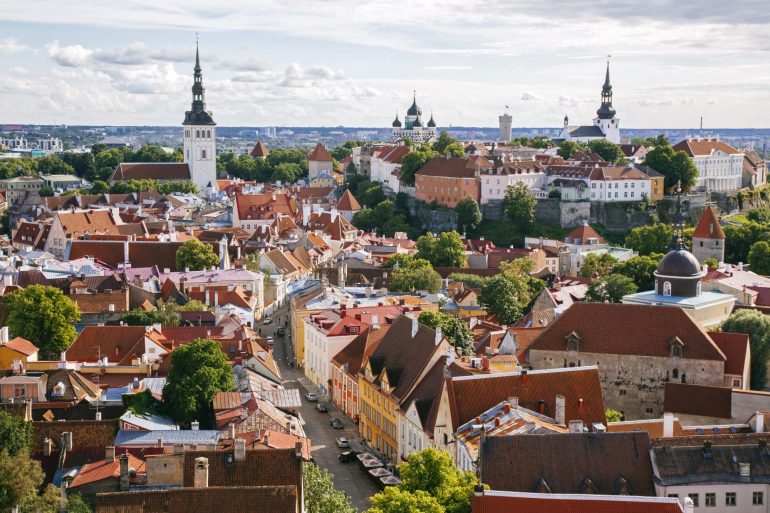5 Remote Work Visa Opportunities (and How to Get There on Points)
Looking to work remotely from somewhere new? These countries have developed special visas just for remote workers.

Many or all of the products on this page are from partners who compensate us when you click to or take an action on their website, but this does not influence our evaluations or ratings. Our opinions are our own.
Due to the coronavirus pandemic, more people are working remotely than ever before. However, working remotely while living through various stages of stay-at-home orders has caused many to reconsider their living arrangements, sometimes leading to an exit from big-city living to a new location in search of more space, better weather or greater access to nature.
Some countries have taken notice and decided to capitalize on the opportunity by offering remote work visas to help attract those who can do their job from their laptop. So, if you’ve dreamed of living on a tropical island during the winter, or amid the picturesque landscapes of Europe during the summer, you’re in luck.
Here’s what you need to know about which countries are offering remote work visas, how you can take advantage of this unique opportunity and how you can travel there on points and miles. Each country is paired with the length of the remote work visa and the cost of acquiring that visa.
1. Georgia (1 year, free)

Georgia is a country on the Black Sea that borders Turkey, Russia, Armenia and Azerbaijan. The country is a popular digital nomad hub, so it is no surprise that Georgia has begun offering digital nomads greater access. For Georgia, it’s more a form than a traditional visa, which makes the process even easier. Currently, only five countries (Germany, France, Latvia, Lithuania and Estonia) are allowed direct, no-quarantine entry into Georgia. Since the U.S. is not on the approved list, this free, one-year visa is the only way U.S. citizens can live and work remotely in Georgia.
To apply, you will need to fill out an online application and, upon approval and arrival into the country, need to quarantine for eight days at an approved location. You will need to show proof of financial means and health insurance coverage that is valid for at least six months.
» Learn more: How to find the best travel insurance
Key details
Internet: Georgia has good Wi-Fi speeds and plenty of places to work from, whether that’s coffee shops or coworking spaces.
Community: Georgia has a strong digital nomad community.
Weather: High temperatures in Georgia from April through October are pleasant, ranging from the 60s to the high 80s. In the winter months, the weather is still relatively mild, especially if you’re comparing that to winters in the Northeastern U.S., with highs in the 40s.
Language: Georgian is the official language, but younger generations are more likely to speak English.
Money: The local currency is the Georgian lari, and the exchange rate fluctuates around $1 USD = 3 GEL.
How to get there on points and miles
There are no direct flights from the U.S. to Georgia so you will likely need to connect in Europe or the Middle East. We recommend flying on Turkish Airlines (Star Alliance) since you will connect in Istanbul, which is fairly close to Georgia. You can use Air Canada’s Aeroplan miles to get a one-way economy ticket partner award on Turkish from the continental U.S. to Georgia for 37,500 miles, while business class will cost 57,500 miles.
Other good Star Alliance options include Lufthansa and United Airlines. You can also consider Oneworld Alliance members Qatar Airways and American Airlines.
» Learn more: Your guide to the Star Alliance
2. Bermuda (1 year, $263)

The Work From Bermuda certificate is a one-year visitor visa aimed at attracting digital nomads and remote workers to live and work from the island. To apply, you must be at least 18 years old, not have been convicted of a crime, have proof of employment or school enrollment, have health insurance and have means of financial support. The website boasts that the application will take only 15 minutes to complete. Although the visa fee is minimal, Bermuda is known as an expensive destination, so you won't be saving a ton of money by moving there.
Key details
Internet: Although high-speed internet is available, plans can be quite pricey.
Community: Bermuda is a relatively safe destination so could be a great option for those traveling with a family.
Weather: The weather is pretty consistent year-round, ranging from the high 60s to the mid 80s. Hurricane season is June through November, so keep that in mind as you plan your travels.
Money: The local currency is the Bermuda dollar, and it is pegged to the U.S. dollar at a 1:1 ratio.
How to get there on points and miles
Our recommended way to get to Bermuda on miles is to fly on American Airlines, which offers one-way flights around 15,000 miles.
3. Estonia (1 year, $118)

Estonia has launched a Digital Nomad Visa, allowing location-independent employees and digital nomads to live in the country for up to a year. You will need to show that you have an employment contract with a company registered outside of Estonia or that you work as a freelancer with non-Estonian clients. In addition, you will need to show that you’ve met the monthly minimum income threshold of 3,504 euros (about $4,130) in the six months preceding your application, which can be a steep requirement for some. The application must be printed and submitted at the Estonian Embassy or Consulate, and it can take up to 30 days to review the application.
It's important to note that Estonia states that if you’re a resident of a country that is prohibited from entering the European Union, your application for the visa will not be successful. So, if you’re American and were hoping to get into Europe using this visa, you will need to wait until the U.S. is on the approved country list.
» Learn more: Where U.S. citizens can travel right now
Key details
Internet: Speeds are solid, which is an important decision point if you’re thinking of relocating.
Community: Tallinn, Estonia's capital, is a digital nomad hub, making the city an excellent option for those looking to settle into a community of remote workers. Estonia is also considered a safe country for travelers.
Weather: Since Estonia is in Northern Europe, the warmest time to be in the country will be from June through September, when average daily temperatures are above 62 degrees Fahrenheit.
Language: The local language is Estonian, but as with many countries in Europe, a lot of people speak another language. In Estonia, that language is most commonly English.
Money: Estonia is on the euro with a varying exchange rate to the U.S. dollar.
How to get there on points and miles
There are no nonstop flights from the U.S. to Tallinn, Estonia. Our recommended way to fly is to use American Airlines miles.
Other airline options include Lufthansa, KLM and Turkish Airlines.
4. Antigua and Barbuda (2 years, $1,500)

The country of Antigua and Barbuda comprises two islands in the Caribbean. It's offering a Nomad Digital Resident, or NDR, visa to attract remote workers. Unlike the Bermuda and Barbados visas, the NDR is valid for two years. To apply, you will need to certify that you expect to earn at least $50,000 per year while on the NDR visa and have sufficient means to support yourself. You will also need to provide a police clearance letter, evidence of employment (self-employment is sufficient), a passport-size photograph and other passport information. For a couple, the visa fee increases to $2,000, and a family of three or more will be required to pay $3,000.
Key details
Internet: While we couldn’t find average internet speeds for the islands, there are several internet providers available including Antigua Computer Technology, Antigua Public Utilities Authority and BSNL Mobile.
Community: The islands aren't known as a digital nomad hub yet, but the country is looking to change that with the issuance of the NDR visa. It is generally considered one of the safer nations in the Caribbean.
Weather: The climate is pretty consistent, with temperatures ranging from the 70s to the 80s year-round.
Language: English is the local language.
Money: The local currency is the East Caribbean dollar, and the exchange rate fluctuates around $1 USD = 2.7 XCD.
How to get there on points and miles
Antigua and Barbuda is also part of the Caribbean region on American Airlines, and using miles is a great way to get there.
Other good options to get to Antigua and Barbuda from the continental U.S. include JetBlue and United.
5. Barbados (1 year, $2,000)

The Barbados Welcome Stamp is a new one-year visa that allows you to work from your laptop while living on the Caribbean island. You can apply online and, along with your application form, will need to submit a passport-size photo, the bio-data page of your passport and proof of relationship of any dependents traveling with you. The visa costs a steep $2,000 for an individual and $3,000 for a family. Barbados states that it will take roughly five working days to process the visa application. Valid medical coverage is a prerequisite for visa approval; however, if you’re unable to purchase a policy in advance, Barbados will offer medical insurance options.
Key details
Internet: According to the government, Barbados offers high-speed fiber internet with very fast download/upload speeds (up to 1,000/500 Mbps) and 4G mobile services.
Community: While Barbados isn’t known as a big digital nomad hub, this new visa is looking to change that. The country is considered relatively safe and is known as a family-friendly destination.
Weather: The weather is similar to Antigua and Barbuda and is pretty consistent all year long with highs in the 80s and lows in the 70s. Hurricane season lasts from June through November, so if you’re planning on making Barbados your home in the winter, you’re in luck. Similar to Antigua and Barbuda, English is the official language in Barbados, which makes it easy for remote workers moving from the U.S.
Money: The local currency is the Bajan dollar and is pegged at a rate of $1 USD = 2 BBD.
How to get there on points and miles
Similar to Bermuda, flying on American Airlines is the best way to get to Barbados using miles.
Other major U.S. carriers with good options to Barbados include Delta and JetBlue.
Other remote work visa options
Costa Rica, Germany, the Czech Republic, Mexico, Portugal and Spain are some of the other countries that offer various forms of long-term visas that allow you to work remotely. However, these countries have slightly stricter requirements ranging from needing a specific city address (Germany) to having a minimum savings account balance (Spain) and many other criteria. Croatia is also expected to issue a digital nomad visa, which would present an excellent option because of Croatia’s beautiful landscape and perfect weather in the summer.
The bottom line
The boom in telecommuting due to COVID-19 has provided plenty of options to people who’d like to move abroad while keeping their remote job. Countries have taken notice and have offered various forms of long-term visas aimed at attracting remote workers.
Due to the variety in remote career options, your individual situation may be more suitable for one country’s visa program compared to another’s. Be sure to check with your employer, too, because there are often tax regulations relating to the location of your work.
Furthermore, while certain countries may have easier application requirements, the cost of living or lack of a community might be a barrier. But the abundance of options is a step in the right direction and is providing a lot of food for thought for those who’d like to try out the digital nomad lifestyle.
Capital One Venture X Rewards Credit Card
Travel
Hotel
With a big sign-up bonus, travel credits, high rewards and airport lounge access, this card could be well worth its annual fee — which is lower than many competitors.


